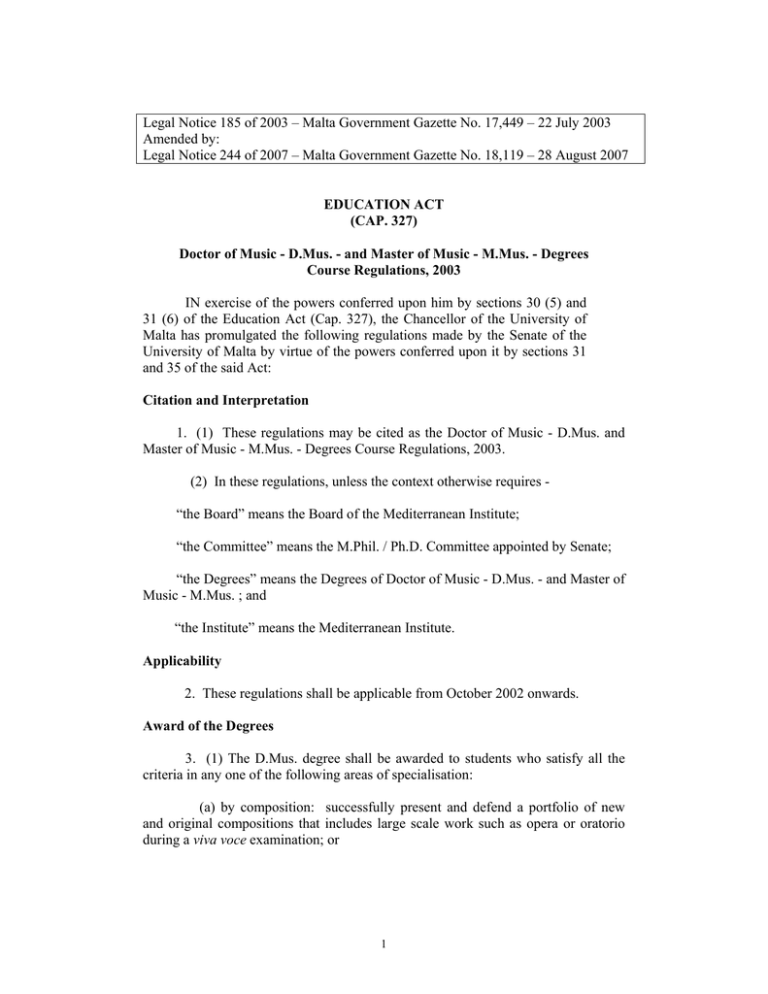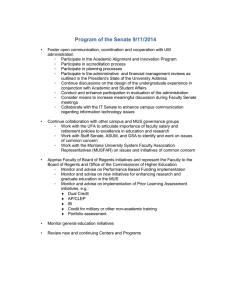Legal Notice 185 of 2003 – Malta Government Gazette No.... Amended by:
advertisement

Legal Notice 185 of 2003 – Malta Government Gazette No. 17,449 – 22 July 2003 Amended by: Legal Notice 244 of 2007 – Malta Government Gazette No. 18,119 – 28 August 2007 EDUCATION ACT (CAP. 327) Doctor of Music - D.Mus. - and Master of Music - M.Mus. - Degrees Course Regulations, 2003 IN exercise of the powers conferred upon him by sections 30 (5) and 31 (6) of the Education Act (Cap. 327), the Chancellor of the University of Malta has promulgated the following regulations made by the Senate of the University of Malta by virtue of the powers conferred upon it by sections 31 and 35 of the said Act: Citation and Interpretation 1. (1) These regulations may be cited as the Doctor of Music - D.Mus. and Master of Music - M.Mus. - Degrees Course Regulations, 2003. (2) In these regulations, unless the context otherwise requires “the Board” means the Board of the Mediterranean Institute; “the Committee” means the M.Phil. / Ph.D. Committee appointed by Senate; “the Degrees” means the Degrees of Doctor of Music - D.Mus. - and Master of Music - M.Mus. ; and “the Institute” means the Mediterranean Institute. Applicability 2. These regulations shall be applicable from October 2002 onwards. Award of the Degrees 3. (1) The D.Mus. degree shall be awarded to students who satisfy all the criteria in any one of the following areas of specialisation: (a) by composition: successfully present and defend a portfolio of new and original compositions that includes large scale work such as opera or oratorio during a viva voce examination; or 1 (b) by performance: successfully present at least four public recitals (that must include large scale works with orchestra), at least two chamber music performances, and the successful defence of a dissertation on the subject of performance during a viva voce examination. All the recitals, including the chamber music performances, except for the final recital, shall be assessed by the supervisor and at least another examiner. They shall use standard criteria and assign a mark and grade which shall contribute towards the final result. The final recital together with the dissertation shall be assessed under normal examination conditions and shall be given a weighting of 65%; or (c) by research in musicology: successfully present a critical and analytic edition of a score of major proportions and historical significance available in manuscript form or dated version and its successful defence during a viva voce examination. (2) The M.Mus. degree shall be awarded to students who satisfy all the criteria in any one of the following areas of specialisation: (a) by composition: successfully present a portfolio of new and original compositions followed by a viva voce examination; or (b) by performance: successfully present three public recitals, and successfully defend a dissertation on the subject of performance during a viva voce examination. Two of the recitals shall be assessed by the supervisor and at least another examiner. They shall use standard criteria and assign a mark and grade which shall contribute towards the final result. The final recital together with the dissertation shall be assessed under normal examination conditions and shall be given a weighting of 65%; or (c) by research in musicology: successfully present a critical and analytic edition of a score of major proportions and significance available in manuscript form or dated version and its successful defence during a viva voce examination. Committee appointed by Senate 4. The Committee appointed by Senate in terms of the Doctor of Philosophy - Ph.D. - and Master of Philosophy - M.Phil. - Degrees Course Regulations shall also be entrusted with the responsibility for these Degrees. Registration for Degrees 5. Applications for registration for the Degrees shall be accepted by Senate, on the recommendations of the Board and of the Committee. 2 6. (1) The Committee shall consider applications for the D.Mus. degree from candidates who possess a Master of Music degree of this or another University or qualifications of comparable standard recognised for this purpose by the Senate. (2) The Committee shall consider applications for the M.Mus. degree from candidates who possess: (a) a good Honours degree in Music Studies (not below Second Class) of this or another University or qualifications of comparable standard recognised for this purpose by the Senate; or (b) a Bachelor’s degree in Music Studies (Category II or higher) or qualifications of comparable standard recognised for this purpose by the Senate, provided that such candidates shall be required, in addition to satisfying any other special conditions laid down by the Board, to follow a Preparatory Course extending over one year of full-time study or its equivalent in part-time study and to complete the course at the standard of at least Second Class Honours. The study-units shall normally be from the Bachelor of Arts (Honours) Music Studies Programme. (3) Applications for the Degrees shall include the following: (a) the proposed title of the project; (b) a detailed research proposal, normally of approximately 1000 words, that includes the compositional tools and techniques in the case of the Degrees by composition, and the analytical tools and performance practices in the case of the Degrees by performance; (c) a statement on whether the studies will be undertaken on a full-time or a part-time basis, and, in the latter case, the number of hours that will be dedicated to this research work; (d) the name of a member of staff of the University who has agreed to act as supervisor, and in special cases, the name of a member of staff of this or another University or of a specialist who has agreed to act as co-supervisor; and (e) a recommendation from the Co-ordinator of the Music Studies Programme that the topic of research is acceptable. (4) The Committee shall submit to Senate all applications which satisfy the requirements under paragraphs (1) to (3) of this regulation. Senate may accept such applications and may impose such conditions as it deems fit. Duration of Studies 7. periods: (1) Studies for the D.Mus. degree shall extend over the following 3 (a) not less than three years and not more than five years in the case of fulltime studies; and (b) not less than four years and not more than eight years (which should normally include one year of full-time study) in the case of part-time studies. (2) The presentation of the works outlined in paragraph (2) of regulation 3 for the D.Mus. degree shall not be considered if submitted later than the maximum period allowed in paragraph (1) of this regulation, unless in special circumstances, on the recommendation of the Board and the Committee, the Senate grants students an extension of studies beyond the maximum period. (3) Notwithstanding the provisions of sub-paragraph (a) of paragraph (1) of this regulation, in exceptional circumstances, the Senate, on the recommendation of the Board and the Committee, may give permission for the presentation of a final concert, the portfolio of compositions and the dissertation for the D.Mus. degree after the equivalent of two years of full-time study have expired from the date of first registration. 8. periods: (1) Studies for the M.Mus. degree shall extend over the following (a) not less than 15 months and not more than 3 years in the case of full-time study; and (b) not less than 30 months and not more than 5 years in the case of part-time studies. (2) The presentation of the works outlined in paragraph (2) of regulation 3 for the M.Mus. degree shall not be considered if submitted later than the maximum period allowed in paragraph (1) of this regulation, unless in special circumstances, on the recommendation of the Board and the Committee, the Senate grants students an extension of studies beyond the maximum period. Annual Registration 9. (1) Students are required to register at the Institute at the beginning of each academic year throughout their period of study. (2) Such registration shall be allowed only on the submission of a satisfactory progress report from the student’s supervisor. 4 Submission of Portfolio of Composition/s or Performance Programme and Dissertation 10. (1) Not less than three months before the intended date of submission, students shall apply to the Board for permission to present the portfolio of composition/s or performance programme and dissertation. Before giving permission, the Board shall consult the students’ supervisor and shall ascertain that the period of study conforms with that stipulated in regulations 7 and 8. (2) When submitting a portfolio of composition/s students shall: (a) submit a signed declaration that the portfolio is their own personal work, and that the greater portion of the work has been done after their registration for the Degree; (b) if a part of the portfolio of composition/s has already been submitted for another degree or qualification or the portfolio has been independently published, a statement to this effect shall be included with it, and the Board of Examiners shall recommend to Senate whether the portfolio should be accepted for examination or not. (3) The dissertations must on no account have already been submitted for any degree or diploma elsewhere, and must not have been published independently by the student, entirely or substantially. Examination of Portfolio of Composition/s or Performance Programme and Dissertation 11. The portfolio of composition/s for these Degrees shall be examined by a Board of Examiners appointed for the purpose by Senate on the recommendation of the Board. 12. The Board of Examiners for the Degrees shall consist of at least three examiners, including a Chairman, an external examiner and another member, provided that the viva voce examination shall be conducted by at least three examiners, and provided that the supervisor is precluded from being an examiner but is invited to attend as an observer during the viva voce examination. (Clear recordings of the performance [authenticated by examiners] must be available for the non-visiting external examiner.) 13. (1) Students shall be required to defend their portfolio orally before the Board of Examiners. The Board of Examiners shall submit a final report to Senate stating whether the student should be admitted to the degree, provided that, in the case of an M.Mus. portfolio, if the external examiner is unable to take part in the final deliberations of the Board of Examiners because of his being abroad, it shall be lawful for the other members of the Board of Examiners to take 5 decisions in his absence so long as any views he may have expressed in writing are taken into consideration and the final decision is acceptable to him. (2) In the case of performance, the dissertation must be examined before the actual final performance takes place. 14. (1) After examining the portfolio of composition/s, the Board of Examiners may refer it back to the student for revision prior to his defending the portfolio. (2) In the case indicated in paragraph (1) of this regulation, the student shall apply to the Board for permission to submit the revised portfolio for examination. The Board shall be guided in its decision by the recommendations of the Board of Examiners but in all cases the revised portfolio shall be submitted for examination within six months of the portfolio being referred back to the student. Such permission shall be granted once only. (3) In the case of composition, a student who fails to satisfy the Board of Examiners in the viva voce examination may, at the discretion of the Board of Examiners and with the permission of the Board, be re-examined orally within a period of six months. Such permission shall be granted once only. (4) If, in a performance, a student for any one of the Degrees does not show a complete mastery of technique and interpretative skills, the Board of Examiners may require a repeat of the performance after a time decided upon by the Board. (5) If a student for the D.Mus. degree does not satisfy the Board of Examiners that his work has reached the standard required for the award of the D.Mus. degree, the Board of Examiners may recommend to Senate the award of an M.Mus. degree. Classification of Awards 15. The D.Mus. degree shall not be classified. The M.Mus. degree shall be classified as follows: Pass with distinction Pass. Dissertation Format and Presentation 16. For the Degrees by composition students shall be required to submit the following: (a) for the D.Mus. degree: the copies of the original portfolio of works shall be presented on regular A3 music sheets with each work separately soft-bound. The 6 dissertation shall be of not less than 25,000 and not more than 30,000 words, exclusive of notes, bibliography, and appendices; and (b) for the M.Mus. degree: the copies of the original portfolio of works shall be presented on regular A3 music sheets with all works soft-bound as a unit. The dissertation shall be of not less than 15,000 words in length, exclusive of notes, bibliography, and appendices. 17. For the Degrees by performance students shall be required to submit the following: (a) for the D.Mus. degree: the programme notes and dissertation shall be in the standard document format and shall be of not less than 25,000 and not more than 30,000 words in length, exclusive of notes, bibliography, and appendices; and (b) for the M.Mus. degree: the programme notes and dissertation shall be in the standard document format and shall be of not less than 15,000 words in length, exclusive of notes, bibliography, and appendices. 18. For the Degrees by research in musicology, students shall be required to submit the following: (a) for the D.Mus. degree: the programme notes and dissertation shall be in the standard document format and shall be of not less than 80,000 and not more than 100,000 words in length, exclusive of notes, bibliography and appendices; and (b) for the M.Mus. degree: the programme notes and dissertation shall be in the standard document format and shall be of not less than 40,000 and not more than 50,000 words in length, exclusive of notes, bibliography and appendices. 19. Following formal approval by the supervisor, four copies should be presented to the Co-ordinator of the Music Studies Programme for forwarding to the Board of Examiners. 20. After the portfolio and dissertation are approved, the students shall submit them in hard-bound form within not more than six weeks from the viva voce examination. 21. Any expenses related to the performance and portfolio of composition/s are to be borne by the students. 11 September 2007 7

